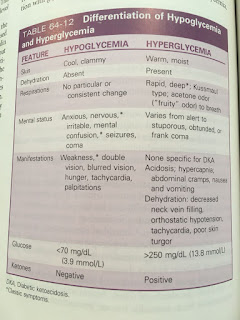What Is Hyperglycemia?
In relation to diabetes, hyperglycemia refers to chronically high blood glucose levels. Most medical professionals define hyperglycemia by using the blood glucose goals that you and your physician have established and combining those goals with the blood glucose target ranges set by the American Diabetes Association.
It’s important to understand that you’ll probably experience high blood glucose levels from time to time, despite your best efforts at control. As with any chronic disease, talk with your physician and diabetes care team if the pattern of your blood glucose readings is consistently higher or lower than your blood glucose goals.
Complications from Hyperglycemia
Persistent hyperglycemia can cause a wide range of chronic complications that affect almost every system in your body. When large blood vessels are affected, it can lead to:
Stroke (cerebral vascular disease)
Heart attack or Congestive Heart Failure (coronary heart disease)
Circulation disorders and possible amputation (peripheral vascular disease)
When smaller blood vessels are affected, it can lead to:
Kidney disease (nephropathy)
Nerve damage (neuropathy)
Diabetic eye disease (retinopathy)

Joseph Monks: Writer, Producer, and Film Director
Joseph Monks, who has diabetic retinopathy, creates and produces films for his production company Sight Unseen Pictures. He is also the first blind filmmaker to direct a feature film.
Says Joe, “I’m not uncomfortable with the term ‘blind.’ I’m not thrilled about it, of course, but it’s accurate. The lights went out for me in early 2002 as a result of diabetic retinopathy—the death of my retinas. It is what it is, so when it happened, I decided that I wasn’t going to let it put an end to my career. As you can imagine, I’m glad I didn’t want to be a pilot!”
Severe Complications from Hyperglycemia
Very high blood glucose levels can also lead to the following acute, life-threatening conditions, both of which require immediate medical attention:
Diabetic Ketoacidosis (DKA) occurs most frequently in persons with type 1 diabetes. DKA results from dehydration during a state of relative insulin deficiency, associated with high blood glucose levels and organic acids called ketones.
Physical signs and symptoms of DKA include:
Hyperglycemia (250 mg/dL or greater)
Dry, parched mouth
Extreme thirst
Frequent urination
General weakness
Fruity breath
Nausea and vomiting
Abdominal pain
Deep, rapid breathing
Hyperosmolar Hyperglycemic Nonketotic Syndrome (or HHNS) occurs most frequently in older adults with type 2 diabetes, especially residents of long-term care facilities. It occurs in people whose diabetes is not controlled properly and is usually brought on by an illness or infection.
Physical signs and symptoms of HHNS include:
Severe hyperglycemia (greater than 600 mg/dL)
Dry, parched mouth
Extreme thirst (which may gradually disappear)
Warm, dry skin that does not sweat
High fever (greater than 101 degrees F)
Sleepiness or confusion
Hallucinations
Weakness on one side of the body
Contact your physician if you note any of the above symptoms. Your physician will decide if this is a mild case that can be treated at home or a moderate to severe case that requires hospitalization.
Reducing the Risk Factors for Complications
You can reduce your risk factors for complications related to hyperglycemia by doing the following:
Maintaining your blood glucose levels within a normal range
Keeping your blood pressure under control
Controlling your blood fats (cholesterol and triglycerides)
Avoiding/stopping smoking
Increasing your physical activity
Avoiding excess alcohol consumption
Developing healthy eating habits and losing weight if necessary
What Is Hypoglycemia?
Hypoglycemia refers to dangerously low blood glucose levels that drop below 70 mg/dL. Significant hypoglycemia is considered below 54 mg/dL. It is an acute complication of diabetes and occurs in individuals who use insulin or specific kinds of oral diabetes medication. If you use oral diabetes medications, ask your physician or diabetes educator whether hypoglycemia should be a concern.
Symptoms of Hypoglycemia
Symptoms of hypoglycemia include the following:
Sweating
Rapid pulse
Shakiness, dizziness, weakness
Decreased coordination
Difficulty concentrating
Blurred vision
Headache
Trouble performing routine tasks
Note: Symptoms can vary from person to person and episode to episode.
Treating Hypoglycemia
To treat hypoglycemia, you must immediately:
Check your blood glucose level to determine the amount of carbohydrate that is needed to raise your blood glucose to a safe level.
Use the 15/15 Rule: Consume 15 grams of carbohydrate (4 ounces of regular juice or soda, 1 tablespoon honey, 2 tablespoons raisins, 7 Life Savers®, 9 Sweet Tarts®, or 3-4 glucose tablets) and retest your blood glucose in 15 minutes. If it is still below 70 mg/dL, you should consume an additional 15 grams of carbohydrate. Following the 15/15 Rule can help avoid over treatment and resulting hyperglycemia.
If you are not planning to have a meal within one to two hours after treating a hypoglycemic reaction, eat a snack containing 15-30 grams of carbohydrate to prevent another episode of hypoglycemia.
Complications from Hypoglycemia
If hypoglycemia is not treated immediately, it can result in:
Severe confusion and disorientation
Unconsciousness
Seizures
Coma
Death
Ways to Manage Hypoglycemia
Other tips for managing hypoglycemia include:
Keep glucose-containing products close by at all times.
Clearly label sugar-free products, in a format of your choosing, to distinguish them from regular products.
Make sure you can test your own blood glucose, measure insulin accurately, and determine recommended food portions to help prevent and properly treat low blood glucose.
Be sure to wear diabetes identification at all times.
Share
Note: Information provided through the Side Effect is for educational and informational use. It is not intended as a substitute for professional advice or treatment. Consult your physician or other professionals as appropriate for medical, legal, financial, and related advice. Side Efffect does not endorse any particular treatment, organization, or product.


No comments:
Post a Comment